- Home
- James Clavell
Gai-Jin Page 4
Gai-Jin Read online
Page 4
“Don’t be silly, of course I’ll wait.” Nervously Tyrer followed the doctor out and closed the door. “Is he going to be all right?”
“I don’t know. Fortunately samurai blades are always clean and they cut as beautifully as any scalpel. Excuse me a minute. I’m the only official here this afternoon, so now that I’ve done everything medically possible for the moment, I’d better act like Her Britannic Majesty’s representative.” Babcott was Deputy to Sir William. He ordered the Legation cutter across the bay to Yokohama to sound the alarm, sent a Chinese servant to fetch the local Governor, another to find out what daimyo, or prince, had passed through Kanagawa a couple of hours ago, put the six-man detachment of soldiers on alert, and poured Tyrer a large whisky. “Drink it, it’s medicinal. You say the assassins shouted something at you?”
“Yes, it, it sounded like ‘sonoh … sonnoh-ee.’”
“Means nothing to me. Make yourself at home. I’ll be back in a moment, I’ve got to get ready.” He went out.
Tyrer’s arm was aching, with seven stitches in it. Though Babcott had been expert, Tyrer had been hard put not to cry out. But he had not and that pleased him. What appalled him were the currents of fear that continued to shake him, making him want to run away and keep on running. “You’re a coward,” he muttered, aghast at the discovery.
Like the surgery, the anteroom stank of chemicals, making his stomach heave. He went to the window and breathed deeply, trying unsuccessfully to clear his head, then sipped some of the whisky. As always the taste was raw and unpleasant. He stared into the glass. Bad pictures there, very bad. A shudder went through him. He forced himself to look just at the liquor. It was golden brown and the smell reminded him of his home in London, his father after dinner sitting in front of the fire with his dram, Mother complacently knitting, their two servants clearing the table, everything warm and cozy and safe, and that reminded him of Garroway’s, his favorite coffee house on Cornhill, warm and bustling and safe, and of university, exciting and friendly but safe. Safe. His whole life safe. But now? Again panic began to overwhelm him. Jesus Christ, what am I doing here?
After their escape but still not far enough away from the Tokaidō, Struan’s bolting pony had shied as her half-severed shoulder muscle gave out and Struan tumbled to the ground. The fall hurt him badly.
With great difficulty, still weak with fear, Tyrer had helped Struan onto his own pony, but he had been barely able to hold the taller, heavier man in the saddle. All the time his attention was on the disappearing cortege, expecting any moment to see mounted samurai. “Can you hold on?”
“Yes, yes, I think so.” Struan’s voice was very weak, his pain great. “Angelique, she got away all right?”
“Yes, yes, she did. The devils killed Canterbury.”
“I saw that. Are … are you hurt?”
“No, not really. I don’t think so. Just a gash in my arm.” Tyrer tore off his coat, cursed at the sudden pain. The wound was a neat slice in the fleshy part of his forearm. He cleaned some of the blood away with a handkerchief, then used it as a bandage. “No veins or arteries cut—but why did they attack us? Why? We weren’t doing any harm.”
“I … I can’t turn around. The bastard got me in the side…. How … how does it look?”
With great care Tyrer eased the split in the broadcloth coat apart. The length and depth of the cut, made worse by the fall, shocked him. Blood pulsated from the wound, frightening him further. “It’s not good. We should get a doctor quickly.”
“We’d … we’d better … better circle for Yokohama.”
“Yes … yes, I suppose so.” The young man held on to Struan and tried to think clearly. People on the Tokaidō were pointing at them. His anxiety increased. Kanagawa was nearby and he could see several temples. “One of them must be ours,” he muttered, a foul taste in his mouth. Then he saw that his hands were covered with blood and his heart again surged with fright, then surged again with relief when he discovered that most of it was Struan’s. “We’ll go on.”
“What … did you say?”
“We’ll go on to Kanagawa—it’s close by and the way clear. I can see several temples, one of them must be ours. There’s bound to be a flag flying.” By Japanese custom, Legations were housed in sections of Buddhist temples. Only temples or monasteries had extra rooms or outbuildings of sufficient size and quantity, so the Bakufu had had some set aside until individual residences could be constructed.
“Can you hold on, Mr. Struan? I’ll lead the pony.”
“Yes.” Struan looked across at his own mount as she whinnied miserably, tried to run again but failed, her leg useless. Blood ran down her side from the savage wound. She stood there shivering. “Put her out of her pain and let’s go on.”
Tyrer had never shot a horse before. He wiped the sweat off his hands. The derringer had twin barrels and was breech-loaded with two of the new bronze cartridges that held bullet and charge and detonator. The pony skittered but could not go far. He stroked her head for a second, gentling her, put the derringer to her ear and pulled the trigger. The immediacy of her death surprised him. And the noise that the gun made. He put it back in his pocket.
Again he wiped his hands, everything still as in a trance. “We’d best stay away from the road, Mr. Struan, best stay out here, safer.”
It took them much longer than he had expected, with ditches and streams to cross. Twice Struan almost lost consciousness, and Tyrer only just managed to keep him from falling again. Peasants in the rice paddies pretended not to see them, or stared at them rudely, then went back to their work, so Tyrer just cursed them and pressed onwards.
The first temple was empty but for a few frightened, shaven-headed Buddhist monks in orange robes who scurried away into inner rooms the moment they saw them. There was a small fountain in the forecourt. Thankfully Tyrer drank some of the cool water, then refilled the cup and brought it to Struan, who drank but could hardly see for pain.
“Thanks. How … how much farther?”
“Not far,” Tyrer said, not knowing which way to go, trying to be brave. “We’ll be there any moment.”
Here the path forked, one way going towards the coast and to another temple soaring above village houses, the other deeper into the town and another temple. For no reason he chose the way towards the coast.
The path meandered, ran back on itself then went east again, no people in the maze of alleys but eyes everywhere. Then he saw the main gate of the temple and the Union Jack and the scarlet-uniformed soldier and almost wept with relief and pride, for at once they were seen and the soldier rushed to help, another went for the Sergeant of the Guard and in no time there was Dr. Babcott towering over him.
“Christ Almighty, what the hell’s happened?”
It had been easy to tell—there was so little to tell.
“Have you ever assisted at an operation before?”
“No, Doctor.”
Babcott smiled, his face and manner genial, his hands moving swiftly, undressing the half-conscious Malcolm Struan as easily as if he were a child. “Well, soon you will have—good experience for you. I need help and I’m the only one here today. You’ll be back in Yokohama by suppertime.”
“I’ll … I’ll try.”
“You’ll probably be sick—it’s the smell mostly, but not to worry. If you are, do it in the basin and not over the patient.” Again Babcott glanced at him, gauging him, asking himself how reliable this young man might be, reading his bottled terror, then went back to work. “We’ll give him ether next and then off we go. You said you were in Peking?”
“Yes, sir, for four months—I came here by way of Shanghai and arrived a few days ago.” Tyrer was glad to be able to talk to help keep his mind off the horrors. “The Foreign Office thought a short stay in Peking learning Chinese characters would help us with Japanish.”
“Waste of time. If you want to speak it—by the way, most of us out here call it Japanese, like Chinese—if you want to read and write it
properly, Chinese characters won’t help, hardly at all.” He shifted the inert man to a more comfortable position. “How much Japanese do you know?”
Tyrer’s unhappiness increased. “Practically none, sir. Just a few words. We were told there would be Japanish—I mean Japanese—grammars and books in Peking, but there weren’t any.”
In spite of his enormous concern over this whole incident, Babcott stopped for a moment and laughed. “Grammars are as rare as a dragon’s dingle and there’re no Japanese dictionaries that I know of, except Father Alvito’s of 1601 and that’s in Portuguese—which I’ve never even seen and only heard about—and the one Reverend Priny’s been working on for years.” He eased off Struan’s white silk shirt, wet with blood. “Do you speak Dutch?”
“Again just a few words. All student interpreters for Japan are supposed to have a six-month course, but the F.O. sent us off on the first available steamer. Why is Dutch the official foreign language used by the Japanese bureaucracy?”
“It isn’t. The F.O. are wrong, and wrong about a lot of things. But it is the only European language presently spoken by a few Bakufu—I’m going to lift him slightly, you pull off his boots then his trousers, but do it gently.”
Awkwardly Tyrer obeyed, using his good left hand.
Now Struan was quite naked on the surgical table. Beyond were the surgical instruments and salves and bottles. Babcott turned away and put on a heavy, waterproofed apron. Instantly Tyrer saw only a butcher. His stomach heaved and he just made the basin in time.
Babcott sighed. How many hundreds of times have I vomited my heart out and then some more? But I need help, so this child has to grow up. “Come here, we have to work quickly.”
“I can’t, I just can’t …”
At once the doctor roughened his voice. “You come over here right smartly and help or Struan will die and, before that I’ll thump the hell out of you!”
Tyrer stumbled over to his side.
“Not here, for God’s sake, opposite me! Hold his hands!”
Struan opened his eyes briefly at Tyrer’s touch and went back again into his nightmare, mouthing incoherently.
“It’s me,” Tyrer muttered, not knowing what else to say.
On the other side of the table Babcott had uncorked the small, unlabeled bottle and now he poured some of the yellowish oily liquid onto a thick linen pad. “Hold him firmly,” he said, and pressed the pad over Struan’s nose and mouth.
At once Struan felt himself being suffocated and grabbed at the pad, almost tearing it away with surprising strength. “For Christ sake, get hold of him,” Babcott snarled. Again Tyrer grabbed Struan’s wrists, forgetting his bad arm, and cried out but managed to hold on, the ether fumes revolting him. Still Struan struggled, twisting his head to escape, feeling himself dragged down into this never-ending cesspool. Gradually his strength waned, and vanished.
“Excellent,” Babcott said. “Astonishing how strong patients are sometimes.” He turned Struan onto his stomach, making his head comfortable, revealing the true extent of the wound that began in his back and came around just under the rib cage to end near his navel. “Keep a close watch on him and tell me if he stirs—when I tell you, give him more ether …” But Tyrer was again at the basin. “Hurry up!”
Babcott did not wait, letting his hands flow, used to operating in far worse circumstances. Crimea with tens of thousands of soldiers dying-cholera, dysentery, smallpox mostly—and then all the wounded, the howls in the night and in the day, and then in the night the Lady of the Lamp who brought order out of chaos in military hospitals. Nurse Nightingale who ordered, cajoled, threatened, demanded, begged but somehow instituted her new ideas and cleansed that which was filthy, cast out hopelessness and useless death, yet still had time to visit the sick and the needy all hours of the night, her oil or candle lamp held high, lighting her passage from bed to bed.
“Don’t know how she did it,” he muttered.
“Sir?”
Momentarily he looked up and saw Tyrer, white-faced, staring at him. He had quite forgotten him. “I was just thinking about the Lady of the Lamp,” he said, allowing his mouth to talk, to calm himself—without letting this disturb his concentration on the sliced muscles and damaged veins. “Florence Nightingale. She went out to the Crimea with just thirty-eight nurses and in four months cut the death rate from forty in every hundred to about two in every hundred.”
Tyrer knew the statistic as every Englishman knew proudly that she had really founded the modern profession of nursing. “What was she like-personally?”
“Terrible, if you didn’t keep everything clean and as she wanted it. Other wise she was Godlike—in its most Christian way. She was born in Florence, in Italy, hence her name—though she was English through and through.”
“Yes.” Tyrer felt the doctor’s warmth. “Wonderful. So wonderful. Did you know her well?”
Babcott’s eyes did not waver from the wound, or from his wise fingers as they probed and found, as he had feared, the severed part of the intestine. He swore without noticing it. Delicately he began seeking the other end. The stench increased. “You were talking about Dutch. You know why some of the Japanners speak Dutch?”
With a violent effort, Tyrer tore his gaze away from the fingers and tried to close his nostrils. He felt his stomach twist. “No, sir.”
Struan stirred. At once Babcott said, “Give him more of the ether … that’s right, don’t press too firmly … good. Well done. How do you feel?”
“Dreadful.”
“Never mind.” The fingers began again, almost outside the doctor’s will, then stopped. Gently they exposed the other part of the severed intestine. “Wash your hands then give me the needle that’s already threaded-there, on the table.”
Tyrer obeyed.
“Good. Thanks.” Babcott began the repair. Very accurately. “His liver’s not hurt, bruised a little but not cut. His kidney’s all right too. Ichiban—that’s Japanese for ‘very good.’ I have a few Japanner patients. In return for my work I make them give me words and phrases. I’ll help you learn if you like.”
“I’d … that would be wonderful—ichiban. Sorry I’m so useless.”
“You’re not. I hate doing this alone. I … well, I get frightened. Funny, but I do.” For a moment his fingers filled the room.
Tyrer looked at Struan’s face, no color now where an hour ago it was ruddy, and strong where now it was stretched and ominous, eyelids flickering from time to time. Strange, he thought, strange how unbelievably naked Struan seems now. Two days ago I’d never even heard his name, now we’re bonded like brothers, now life is different, will be different for both of us, like it or not. And I know he’s brave and I’m not.
“Ah, you asked about Dutch,” Babcott said, scarcely listening to himself, all his attention on the repairs. “Since about 1640 the only contact Japanners have had with the outside, apart from China, has been with Dutchmen. All others were forbidden to land in Japan, particularly Spaniards and Portuguese. Japanners don’t like Catholics because they meddled in their politics back in the 1600s. At one time, so legend says, Japan almost went Catholic. Do you know any of this?”
“No, sir.”
“So the Dutch were tolerated because they’d never brought missionaries here, just wanted to trade.” For a moment he stopped talking but his fingers continued the fine neat stitches. Then he rambled on again. “So a few Hollanders—men, never women—were allowed to stay, but only with the most severe restrictions and confined on a man-made island of three acres in Nagasaki harbor called Deshima. The Dutch obeyed any law the Japanners made, and kowtowed—growing rich meanwhile. They brought in books, when they were allowed, traded, when they were allowed, and carried the China trade that’s essential to Japan—Chinese silks and silver for gold, paper, lacquer, chopsticks—you know what those are?”
“Yes, sir. I was in Peking for three months.”
“Oh yes, sorry, I forgot. Never mind. According to Dutch journals of the
1600s the first of the Toranaga Shōguns, their equivalent of emperors, decided foreign influence was against Japan’s interests, so he closed the country and decreed that Japanners could not build any oceangoing ships, or leave the country—anyone who did could not come back, or if they returned, they were to be killed instantly. That’s still the law.” His fingers stopped for an instant as the delicate thread parted and he cursed. “Give me the other needle. Can’t get decent gut, though this silk’s fine. Try to thread one of the others but wash your hands first and wash it when you’re done. Thanks.”
Tyrer was glad to have something to do and turned away, but his fingers were helpless. His nausea was growing again, his head throbbing. “You were saying, about the Dutch?”
“Ah, yes. So, warily, Dutch and Japanners began learning from the other though the Dutch were officially forbidden to learn Japanese. Ten-odd years ago the Bakufu started a Dutch language school …” Both men heard the running feet.
Hasty knock. The sweating Grenadier Sergeant stood there, trained never to enter while an operation was in progress. “Sorry to interrupt, sir, but there’s four of the rotten little buggers coming down the road. Looks like a deputation. They’s all samurai.”
The doctor did not stop sewing. “Is Lim with them?”
“Yessir.”
“Escort them into the reception room and tell Lim to look after them. I’ll be there as soon as I can.”
“Yessir.” The Sergeant took one last glazed look at the table, then fled.
The doctor completed another stitch, knotted it, cut the thread, swabbed the oozing wound, and began anew. “Lim’s one of our Chinese assistants. Our Chinese do most of our leg work, not that they’re Japanese speakers or—or very trustworthy.”
“We … it was the same … we found it was the same in Peking, sir. Dreadful liars.”
“The Japanners are worse—but in a way that’s not true either. It’s not that they’re liars, it’s just that truth is mobile and depends on the whim of the speaker. Very important for you to learn to speak Japanese very quickly. We don’t have even one interpreter, not of our own people.”

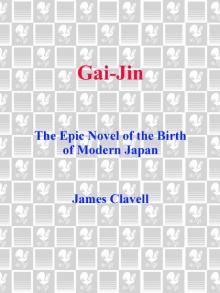 Gai-Jin
Gai-Jin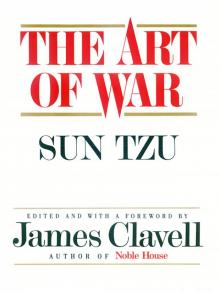 The Art of War
The Art of War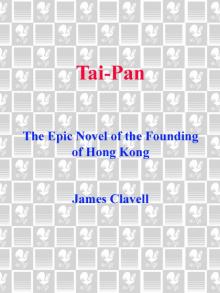 Tai-Pan
Tai-Pan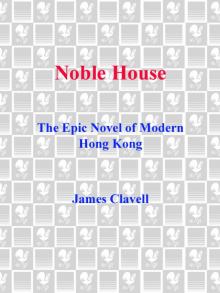 Noble House
Noble House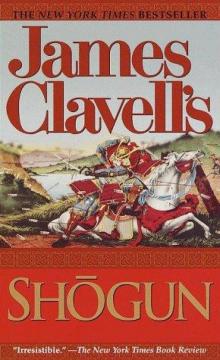 Shōgun
Shōgun Whirlwind
Whirlwind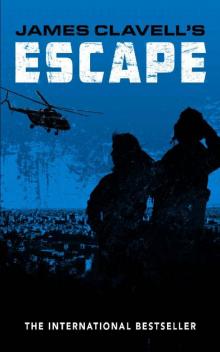 Escape
Escape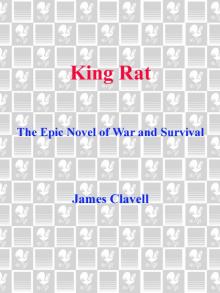 King Rat
King Rat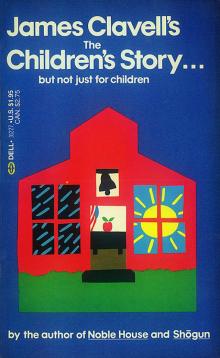 The Children's Story
The Children's Story